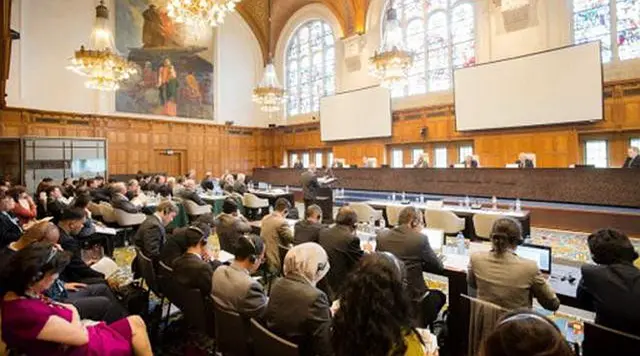An arbitral tribunal with widely contested jurisdiction will issue an award on July 12 on the South China Sea case unilaterally initiated by the Philippines, the Permanent Court of Arbitration (PCA) in The Hague said on Wednesday.
"The Tribunal will issue its Award on Tuesday, 12 July 2016 at approximately 11 A.M.," the PCA, acting as the registry of the tribunal, said in a press release.
"The Award will first be issued via e-mail to the Parties, along with an accompanying Press Release containing a summary of the Award," it said.
China has refused to participate in the proceedings and declared that it will never recognize the verdict, stressing that the tribunal has no jurisdiction because the case is in essence related to territorial sovereignty and maritime delimitation.
Under the UN Convention on the Law of the Sea (UNCLOS), the jurisdiction of an arbitral tribunal is limited to disputes concerning the interpretation or application of the convention.
But the South China Sea case is in essence about territorial sovereignty and maritime delimitation.
Territorial issues are not subject to UNCLOS, but to general international law. The tribunal in the Chagos Marine Protected Area Arbitration case noted its verdict in 2015 that sovereignty over land territory is a matter beyond the scope of the interpretation and application of UNCLOS.
Beijing has pointed out that territorial issues are not subject to the UN Convention on the Law of the Sea (UNCLOS), and that as early as in 2006 it declared -- in line with UNCLOS -- to exclude disputes concerning maritime delimitation from mandatory dispute-settlement procedures. Some 30 countries have also filed declarations of this kind.
After the PCA set date for the issuance of the final award, Chinese Foreign Ministry spokesman Hong Lei said the arbitral tribunal has no jurisdiction over the case and the relevant subject-matter, and that it should not have heard the case or rendered the award.
"The Philippines' unilateral initiation of arbitration breaches international law," he said late Wednesday.
"With regard to territorial issues and maritime delimitation disputes, China does not accept any means of third party dispute settlement or any solution imposed on China," he stressed.
The government of outgoing Philippine President Benigno Aquino III filed the arbitration against China in 2013, despite the agreement his country had reached with China on resolving their South China Sea disputes through bilateral negotiations.
The South China Sea arbitration unilaterally initiated by the Philippines does not hold water from a legal standpoint and will not put an end to the South China Sea disputes, but only worsen them.
It even threatens to further complicate the issue by giving certain parties in the disputes the false impression they could profit by deliberately creating chaos.
The tribunal handling the arbitration case will issue an award on July 12, according to a press release published Wednesday by its registry, the Permanent Court of Arbitration (PCA) in The Hague.
Whatever the verdict might be, the basically illegal nature of the arbitration will make it null and void.
The United Nations Convention on the Law of the Sea (UNCLOS) clearly states that a tribunal will not be entitled to pass judgment on a territorial and boundary dispute.
The tribunal has distorted the UNCLOS by extending its jurisdiction and has overstepped its power to make a judgment on territorial sovereignty.
Despite all the verbal manipulations by the tribunal, which said it would not try to settle sovereignty disputes, but only determine geological features, the Philippines' claims will eventually lead to the question of who owns it.
The arbitration also infringes on China's right to refuse to accept any imposed rulings on territorial and delimitation disputes, which is ensured by the UNCLOS.
Moreover, an arbitration requires the consent of the two concerned parties. China's stance of non-acceptance of and non-participation in the arbitration not only secures its own interests, but also preserves the right of other countries facing a similar situation.
It is protecting the authority and completeness of the UNCLOS within its frame, and that's why China's position on the South China Sea issue has gained more and more countries' understanding and support.
Any just international arbitration is aimed at eventually solving disputes and conflicts and pushing forward the peace process and development. It is unthinkable a tribunal would create chaos or worsen a crisis in its own right.
The UNCLOS also explicitly rules out any infringements on the rights of relevant parties in a conflict to solve their problems through dialogue and negotiations.
China and the Philippines, along with other members of the Association of Southeast Asian Nations (ASEAN), in 2002 signed the Declaration on the Conduct of Parties (DOC) in the South China Sea, which should serve as the political framework for solving the issue.
It's apparent that China and other relevant countries in the region have developed their own effective method by solving the problem through consultations.
By going ahead with the arbitration, Manila has deviated from the right path of putting an end to its dispute with China.
"Negotiation is the only best method for this kind of disputes, particularly with so many difficult features coming from a long background and history," added Rao, a participant in the Third UN Conference on the Law of the Sea from 1973 to 1982, which led to the adoption of UNCLOS.
Many in the Philippines share this view. Earlier this month, Rosario Manalo, a former Philippine foreign affairs under-secretary for international economic relations, said the best thing for both the Philippines and China is to "sit down and talk."
(APD)
 简体中文
简体中文



